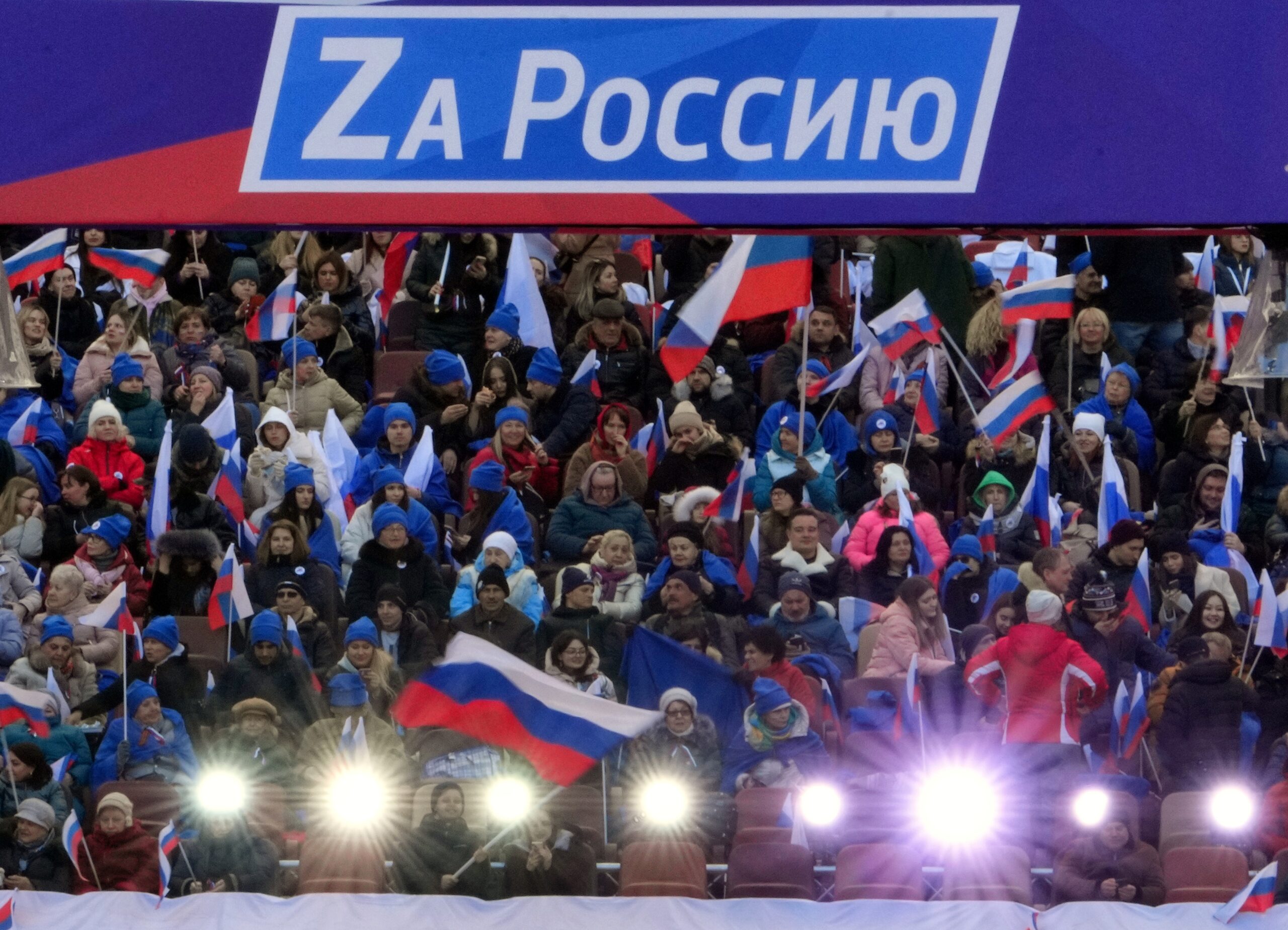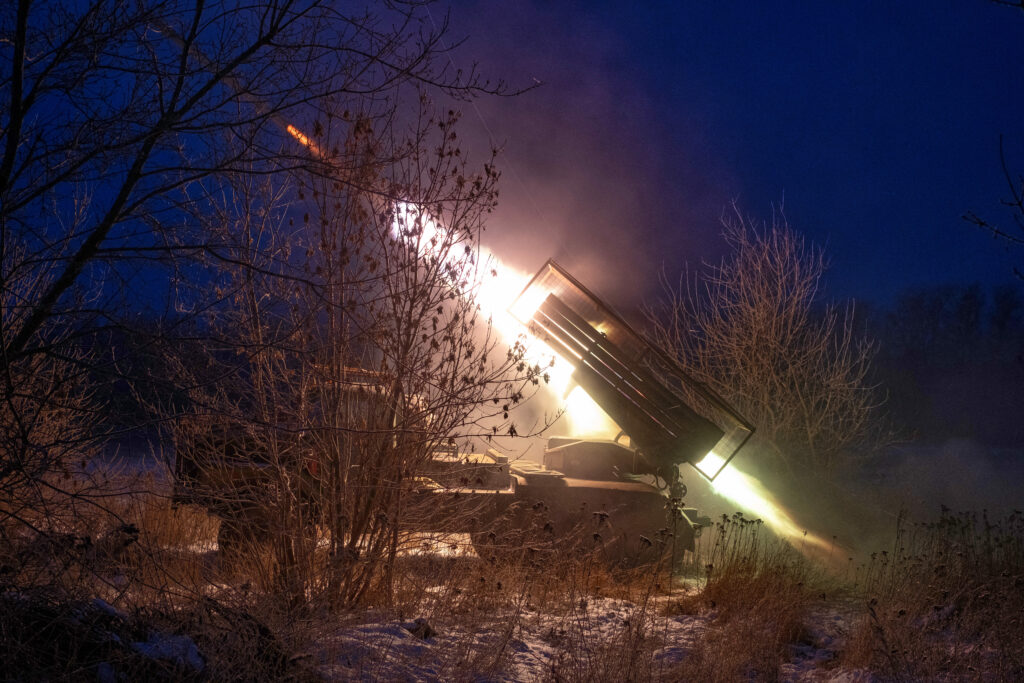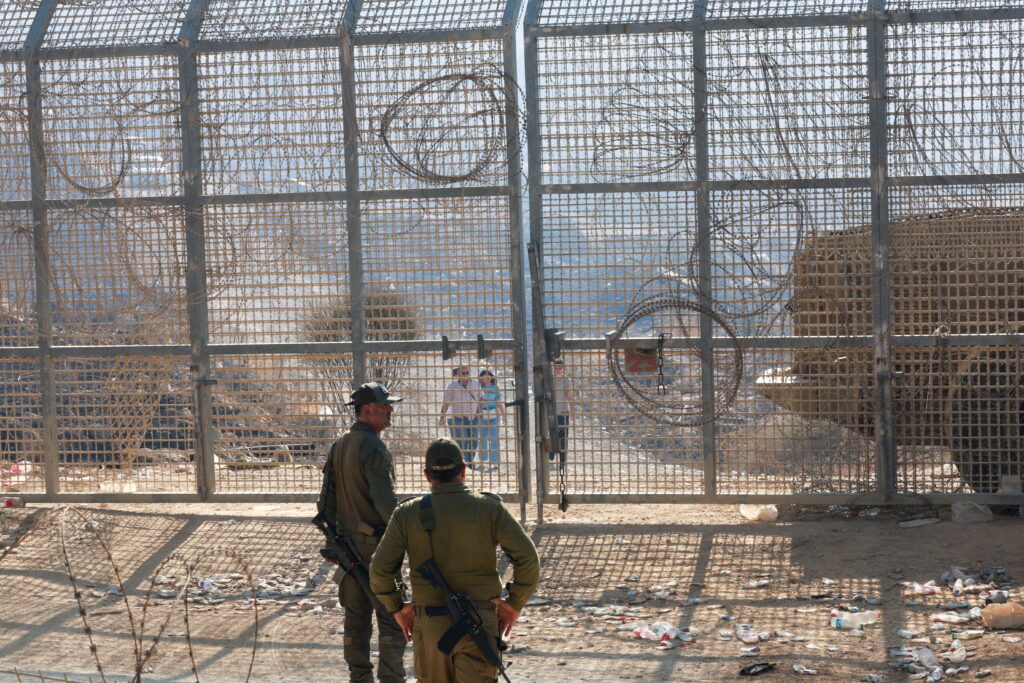Since the early days of the invasion of Ukraine, the Kremlin’s propaganda and political blocs began to create a new aesthetic to accompany wartime. After a few months of warfare, it is almost ready. The war has developed its own symbols, and the media began to promote ultra-patriotic poets who regularly write poems on current topics. Pop and rock performers come up with songs about Donbass and the army, and there are even patriotic comedians. The quintessence of patriotic pop, however, can be found in television shows, not much different in terms of content and sincerity from televised amateur variety revues. The military aesthetic, as presented by artists who are loyal to the authorities, has turned out to be utterly false and opportunistic. It exists only because the Kremlin has created a demand for it whereas the citizens are not particularly eager to listen to patriotic pop.
Fight or Lose
The presidential administration began to seek an aesthetic accompaniment to warfare in the first weeks after the war broke out. On 18 March, the Luzhniki Stadium in Moscow hosted a patriotic concert, formally dedicated to the 8th anniversary of the annexation of Crimea, with a speech by President Vladimir Putin and performances by artists such as Lyube and Oleg Gazmanov, who have long been closely linked to the authorities. The scene was decorated with slogans such as ‘For President’ and ‘For Russia’ using the Latin letter ‘Z’, which the Russian authorities are trying to turn into a symbol of invasion and patriotism. A month later, the latter slogan was used as a name for a patriotic ‘marathon’, with concerts organised in 31 Russian cities. The events, collectively branded ‘For Russia’, had additional titles of their own, for instance ‘Victory is ours’, ‘For you, Motherland’, ‘Everything will work out!’, ‘Everything will be fine!’, and ‘We don’t abandon our own people’. They were officially commissioned by the Ministry of Culture, and contracted out to EISI, the think tank affiliated with the presidential administration. Performers included Gazmanov, the Serga and Uma Thurman bands, singer Denis Maidanov (who is the State Duma member representing United Russia), and other stars closely connected with the government. The presidential administration’s political strategists used a tried-and-tested recipe: in 1996, the Kremlin organised a ‘Vote or Lose’ pre-election tour in support of Boris Yeltsin. The invited rock and pop stars asked the audiences to vote for the incumbent president. Neither the participants nor the organisers of the tour tried to hide their commercial connections. Yuri Shevchuk, the leader of DDT band, who refused to participate in the marathon, quoted the sum that was offered for concerts in two or three cities: USD 120,000. The idea turned out to be quite popular, with thousands of people coming to see their favourite stars for free. It is unclear how many viewers were actually convinced to support the president, but the marathon did play a positive role in Yeltsin’s victory. Thousands of people in stadiums, who came mainly to listen to the top artists rather than to express a political stance, were automatically ‘enlisted’ as Yeltsin’s supporters. The concerts were intended to dispel the myth of Boris Yeltsin’s unpopularity and, by and large, they accomplished this mission successfully.
In contrast, the ‘For Russia’ marathon does not enjoy a similar success: even though the concerts were free of charge, in many cities they only drew a few hundred people (mostly students and public sector workers). In some regions, the authorities far-sightedly made the event half-closed. Unlike the tour in support of Yeltsin, this time the organisers ate a humble pie: there was no mass turnout at the concerts. In most regions, people did not want to watch well-familiar artists around Z-slogans, performing patriotic hits. As a result, the authorities did not succeed in creating a picture of mass support for the war, even indirectly. The Kremlin did not attempt to hold any more rounds of ‘For Russia’.
To spite the world
In parallel, we see the arrival of artists who are trying to jump on the Donbass war bandwagon, which is in high demand from the authorities. The artists and their producers alike understand very well that if they manage to produce a popular hit on the topic, the authorities will definitely support them financially and provide ample TV airtime. SHAMAN, who was not famous before the war, is the most notable representative of this type: a guy with dreadlocks, dressed in the style resembling the 1970s hard-rock bands. On 23 February, his video ‘Let’s Stand Up‘ was released on YouTube, and the song was probably written to mark the ‘Defender of the Fatherland Day’, an official Russian holiday.
Let’s stand up
While we’re still with you and the truth is ours
There’s someone up there looking down at us with kindred eyes
They were smiling like children as they marched into the sky
Let’s stand up
And get closer to them
The lyrics were not very carefully crafted, as evidenced by the simple Russian rhymes. However, the song turned out to be quite useful for the authorities during the war: the video clip was distributed through patriotic Telegram channels and aired on TV, and the song was played on the radio. The video got an impressive 25.7 million hits on YouTube. However, if we compare these figures with the former hits of the popular ‘Leningrad’ band that got 150−200 million views, or with the not-so-well-known songs by Bi-2, it becomes evident that SHAMAN’s song did not become into a nation-wide hit. The singer’s next track called ‘I’m Russian’ gained a half of that number, even though it was advertised by Dmitry Kiselev in his show. The lyrics are fully in line with the official propaganda: the whole world is offending Russia, but Russia continues to live nevertheless:
I’m Russian, I go all the way
I’m Russian, my blood comes from my father
I’m Russian, and I’m lucky
I’m Russian, to spite all the world
Interestingly, a simple parody of this song, entitled ‘I’m narrow’ (‘narrow’ rhymes with ‘Russian’: russkiy-uzkiy), made by TV host Alexandr Gudkov, collected 3 million views, without being purposefully promoted (unless we take loyalists’ complaints about Gudkov’s clip as a form of promotion). Other rap, pop and rock performers are also exploiting the Donbass war theme. Among them are, for example, rapper Zhigan, the Zveroboy band, singer Yuta and Oleg Gazmanov.
The songs repeat the all-too-familiar clichés about eight years (i.e. how long the conflict in Donbass has been going on) and about Russia as a country that is walking along its very own path and no one should dare to tell it what to do and how. In order to understand the popularity of this theme with Russian audiences, it is enough to look at You Tube figures. Zhigan’s video has been viewed by just over 20,000 people, while Gazmanov’s clip attracted just over 60,000. One of the most famous patriotic songs ‘Plyve kacha‘ by Akim Apachev, with fairly non-trivial lyrics and in Ukrainian, got 82,000 views. One can say that some Russian musicians took up the military theme presumably for opportunistic reasons (judging by the lyrics and music), hoping to get support from the authorities or expecting that the topic of war is actually popular among compatriots. Some performers use viral occasions (sporting events, holidays) for song-writing. As a rule, opportunism and falsehood shine through such works quite glaringly. In fact, most of the songs about the ‘special operation’ are not an exception to this rule. The artists’ hopes for the authorities’ support have indeed paid off: the authors of ‘Donbass songs’ are being invited on TV, but, judging by YouTube statistics, the audience has given a cold shoulder to their ‘military sketches’.
Poems for the occasion
The ‘wartime poets’, who have also been invited to TV shows and free patriotic festivals, are not popular with the masses, either. The author of poems on Donbass topics, Anna Dolgareva, has just over 40,000 subscribers in her Telegram channel, which is relatively little for an actively promoted persona. Igor Karaulov, who also exploits patriotic themes in lyrics, has even fewer subscribers: merely 7,000, while his colleague Maria Vatutina has not even reached 3,000. This happens in parallel with the popularity of Telegram channels established by the so-called ‘war correspondents’, eagerly read by the ultra-patriotic audiences (the most popular war correspondents have several hundred thousand subscribers). What is the reason? Most likely, it is because the quality of the poems is not exactly mind-boggling.
In the days of Izyum, Kupiansk,
Balakliia when,
the American artillery was pressing,
the Polyansk horde was marching.
This is how Maria Vatutina described the Ukrainian offensive in the Kharkiv region.
Igor Karaulov responded to an attack by the Armed Forces of Ukraine (AFU) in the Kherson region:
A simple Russian face,
looks calm and innocent.
He is a Special Forces lieutenant,
he fought for Ukraine.
In the battle by the Inhulets river
he rolled on the armour into the village,
and then he met his end:
a shrapnel sticking out of his head.
The poet could not help but react to the death of former USSR President Mikhail Gorbachev:
«Our whole life is a Pizza Hut commercial,»
he said in a conversation with Deutsche Welle. –
«Who’s not a slimebag? Who isn’t guilty?
I wasn’t the only one, we were all in it."
Karaulov also jotted some lines to comment on the visit of Nancy Pelosi, speaker of the U.S. House of Representatives, to Taiwan:
The world went crazy as Pelosi went off the ramp.
You won’t fly anywhere from Taiwan.
Pray for us sinners, Pope of Rome,
hold on tight to your Latin cross.
The authors of these lines (you can hardly call them ‘poets’ in all seriousness) pick up rhymes on current patriotic themes and use common propaganda clichés. This creative work is extremely opportunistic. Indeed, the average turbo-patriot does not know much about Gorbachev: ‘he made the USSR fall apart’ and ‘he starred in a pizza commercial’ are the most popular snippets of knowledge. In the poem, the offensive in the Kharkiv region was not led by the AFU, but by ‘American artillery’, namely the NATO forces, and the TV propagandists talk about fighting them. In a sense, these poems are like rhymed greetings written for birthdays, weddings and similar occasions. These ‘pre-ordered’ poems have little in common with literature, and are of little interest even to like-minded ultra-patriots.
Anna Dolgareva’s poems are more complex: they are more lyrical and romantic, and the poet herself is more talented — she does not use clichés in a straightforward way and is more inclined towards tales of ‘frontline romanticism’.
Carrying strings upon unloading,
A frame on the portrait.
Where are your moms?
I am your mum.
How they go past the Smorodina river,
Past the Donets river, past dead water,
Past my dead Soviet homeland,
For our freedom and yours.
In fact, she does not shy away from overtly opportunistic themes, either. After the propaganda machine began to promote one of the new symbols of war, i.e. an old woman who waved at flying Russian helicopters and blessed them, Anna Dolgareva rushed to compose a poem about her.
A sunflower bloomed, round and very young,
and looked to the west, beyond the shining light.
Grandma blessed the helicopters,
With her three fingers she blessed them in the air.
«Our people» for our people
Dolgareva read these lines on air during a new TV show called ‘Svoi’ (Our Own) on the first channel of Russian TV. This show can be regarded as the quintessence of wartime pop aesthetic. The show is hosted by poet Vladislav Malenko, not exactly the best-known figure among the masses, and features people and groups mentioned earlier in the text, i.e. pop and rock musicians, poets and war correspondents. Malenko, dressed in a camouflage style shirt, calls the speakers «brothers» and «sisters» and «his people,» shaking hands and hugging them. War correspondents discuss the works of the z‑musicians, the latter speak respectfully of the war correspondents, poets listen to the music and, not surprisingly, praise it. The show is reminiscent of the thematic amateur revue concerts on TV which are held, for instance, on New Year’s Eve or International Women’s Day, the only difference being that the participants in the patriotic show sing and recite poems about the war, rather than about the holiday. However, the rule remains the same: an opportunistic product on a specific topic has been concocted.
The spectacle is watched with quite some indifference by the crowd, accustomed to TV shows, who knows when to clap, when to shout and when to laugh. The wartime pop aesthetic was supposed to inspire support for the war among the masses, but it demonstrates ideological helplessness instead. Most of Russia’s talented musicians either have already spoken out against the war, or at least have remained silent. Attempts to seize an opportune moment came from far less popular pop and rock musicians. However, as could have been expected, not many are willing to lend a listening ear to those clichéd songs and poems. So far, the Kremlin has not even tried to offer citizens an ideological justification for the war with Ukraine. ‘Denazification’ and ‘demilitarisation’ do not sound well in poems or lyrics, so musicians and poets who have joined the patriotic marathon must struggle to find rhymes for ‘Donbass’, ‘where have you been for 8 years’ and ‘artillery’. The ‘war pop’ project, like many other projects initiated by the Russian authorities, has proved unviable. It imitates tempestuous activity just to please the bosses. If Vladimir Putin, who certainly remembers Yeltsin’s ‘Vote or Lose’ tour, asks the curators of the political and information bloc, «Where are the masters of culture and who are they with?,» then Sergei Kirienko and Alexey Gromov will have something to show.
The imitative and opportunistic nature of ‘z-pop culture’ and its low popularity among citizens is yet another evidence that apathetic Russians are alienated from the current events even at the level of semi-entertaining shows and events. The carefully selected artists receive royalties from the officials based on the well-known rule: ‘You scratch my back and I’ll scratch yours’. This is watched by the paid-up mass audience, accustomed to various TV shows.
All in all, the ‘Fight or Lose’ tour did not really get off to a great start, either for ultra-patriotic artists or the Kremlin sponsors who took them under their wing.










